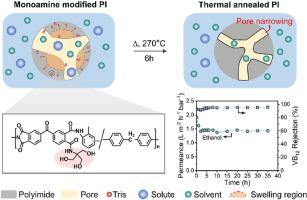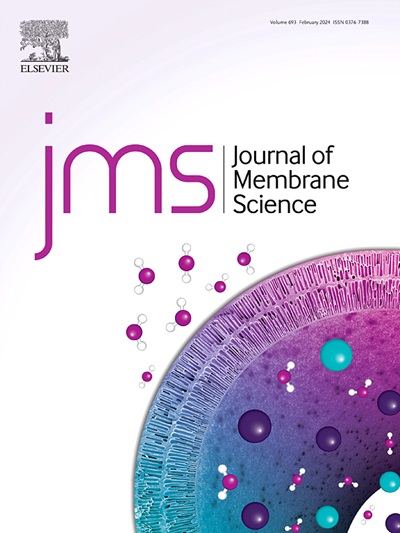Solvent resistant asymmetrical polyimide nanofiltration membranes prepared via combining surface chemical grafting with thermal-induced pore narrowing
IF 9
1区 工程技术
Q1 ENGINEERING, CHEMICAL
引用次数: 0
Abstract
Polymeric membranes with precise sieving and robust solvent resistance are desirable for molecular separation via organic solvent nanofiltration (OSN). Polyimide (PI) is a promising membrane-forming material used in OSN owing to its high thermal stability and excellent solvent resistance. However, effective methods constructing integrated ultrathin selective layer for asymmetrical PI membranes to achieve high separation accuracy and enhanced solvent resistance are rarely reported. In this work, we developed an integrally skinned asymmetrical OSN membrane by grafting tris(hydroxymethyl) aminomethane onto the PI ultrafiltration membranes, followed by a thermal annealing step at a temperature that is much lower than the glass transition temperature of PI. A dense skin layer was successfully created on the monoamine-modified PI membranes due to thermal-induced surface pore narrowing, companied by efficient intermolecular imidization. The optimised membrane exhibited acceptable and stable solvent permeance for ethanol (1.6 L m−2 h−1 bar−1) and acetonitrile (9.8 L m−2 h−1 bar−1). The typical membrane had a molecular weight cut-off of approximately 350 Da and demonstrated highly efficient separation of methyl orange from isatin in ethanol, indicating excellent molecular sieving properties. Moreover, the chemically crosslinked characteristic endowed the thermal-treated PI with remarkable stability of the permeation and separation performances in long-term OSN application. This work offers a convenient strategy to manufacture solvent-resistant polymeric membranes for highly-efficient molecular separation in organic solvent.

通过表面化学接枝与热致孔隙变窄相结合制备耐溶剂非对称聚酰亚胺纳滤膜
通过有机溶剂纳滤(OSN)进行分子分离时,需要筛分精确、耐溶剂性强的聚合物膜。聚酰亚胺(PI)具有较高的热稳定性和出色的耐溶剂性,是一种很有前途的用于有机溶剂纳滤网的成膜材料。然而,为非对称聚酰亚胺膜构建集成超薄选择层以实现高分离精度和增强耐溶剂性的有效方法却鲜有报道。在这项工作中,我们通过在 PI 超滤膜上接枝三(羟甲基)氨基甲烷,然后在远低于 PI 玻璃转变温度的温度下进行热退火步骤,开发了一种集成表皮的非对称 OSN 膜。由于热引起的表面孔隙变窄以及分子间的有效酰亚胺化,单胺改性聚对苯二甲酸酯膜上成功形成了致密的表皮层。优化后的膜对乙醇(1.6 升/米-2 小时-1 巴-1)和乙腈(9.8 升/米-2 小时-1 巴-1)具有可接受的稳定溶剂渗透性。典型膜的截留分子量约为 350 Da,能高效分离乙醇中的甲基橙和异靛红,这表明膜具有出色的分子筛分特性。此外,化学交联特性还赋予了热处理 PI 在长期 OSN 应用中渗透和分离性能的显著稳定性。这项工作为制造用于有机溶剂中高效分子分离的耐溶剂聚合物膜提供了一种便捷的策略。
本文章由计算机程序翻译,如有差异,请以英文原文为准。
求助全文
约1分钟内获得全文
求助全文
来源期刊

Journal of Membrane Science
工程技术-高分子科学
CiteScore
17.10
自引率
17.90%
发文量
1031
审稿时长
2.5 months
期刊介绍:
The Journal of Membrane Science is a publication that focuses on membrane systems and is aimed at academic and industrial chemists, chemical engineers, materials scientists, and membranologists. It publishes original research and reviews on various aspects of membrane transport, membrane formation/structure, fouling, module/process design, and processes/applications. The journal primarily focuses on the structure, function, and performance of non-biological membranes but also includes papers that relate to biological membranes. The Journal of Membrane Science publishes Full Text Papers, State-of-the-Art Reviews, Letters to the Editor, and Perspectives.
 求助内容:
求助内容: 应助结果提醒方式:
应助结果提醒方式:


